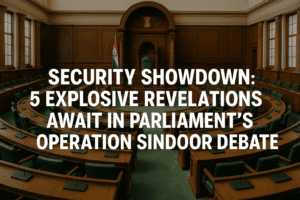Parliament’s upcoming Monsoon Session will feature a significant debate on Operation Sindoor after the government accepted the Opposition’s demand, acknowledging the operation’s critical importance following the Pahalgam terror attack. However, the government declined to discuss the contentious Special Intensive Revision of electoral rolls in election-bound Bihar, highlighting a strategic political divide. The unified INDIA bloc, representing 24 parties, solidified eight key issues for the session, including national security and foreign policy.
This selective acceptance reveals the government’s calculus: permitting scrutiny of essential military actions while avoiding politically sensitive electoral oversight. The Sindoor debate offers crucial democratic accountability for counter-terrorism strategy, whereas silence on Bihar’s voter rolls risks undermining public trust in electoral integrity. The session thus balances national security imperatives against foundational democratic safeguards, with profound implications for both governance credibility and federal processes. Ultimately, Parliament faces the test of prioritizing substantive oversight over partisan management during a period of heightened political stakes.

The upcoming Monsoon Session of Parliament, commencing July 21st, is set to feature a high-stakes debate on national security following a significant concession by the government. Sources confirm the Centre has agreed to the principal demand of the Opposition INDIA bloc: a dedicated discussion on Operation Sindoor, the military response to the devastating Pahalgam terror attack.
This move signals a potential shift in parliamentary dynamics, acknowledging the profound public and political resonance of an operation launched after the April 22nd attack that claimed 26 lives. The debate will provide a crucial platform to scrutinize the operation’s objectives, execution, and implications for regional security and India’s counter-terrorism strategy.
However, Consensus Stops Short:
While accepting the demand on Operation Sindoor, the government remains non-committal on another critical issue raised by the Opposition: the ongoing Special Intensive Revision (SIR) of electoral rolls in Bihar. With state elections looming, Opposition parties have expressed deep concerns about the process’s timing, methodology, and potential for manipulation. The government’s current reluctance to debate this underscores the deeply political nature of electoral preparations and highlights ongoing tensions regarding federal processes and fairness.
Opposition Presents United Front:
The INDIA bloc demonstrated notable cohesion in a virtual meeting held Saturday. Leaders from 24 constituent parties, including Sonia Gandhi, Mallikarjun Kharge, Rahul Gandhi (Congress), Uddhav Thackeray (Shiv Sena UBT), Sharad Pawar (NCP SP), Mamata Banerjee’s representative Abhishek Banerjee (TMC), Tejashwi Yadav (RJD), Omar Abdullah (NC), and Hemant Soren (JMM), solidified a shared agenda. Their eight key demands extend beyond Sindoor and Bihar’s rolls to include:
- The Pahalgam terror attack itself.
- Implications of former US President Donald Trump’s recent ceasefire announcement.
- Broader contours of India’s foreign policy direction.
- Functioning and independence of constitutional bodies like the Election Commission.
Why This Session Matters:
This Monsoon Session (July 21 – August 21) is the first full session since the Pahalgam tragedy and the subsequent launch of Operation Sindoor. It occurs against a backdrop of heightened security concerns and intense political maneuvering ahead of crucial state elections. The government’s selective acceptance of debates reveals strategic priorities:
- Operation Sindoor: Acknowledging the unavoidable need for parliamentary scrutiny of a major military action with national security and foreign policy ramifications.
- Bihar SIR: Demonstrating caution on an issue perceived as directly impacting the electoral fortunes of key players in a pivotal state, wary of setting a precedent or facing criticism about the revision process.
Adding Human Value: The Stakes Beyond Politics
The agreed-upon Sindoor debate isn’t just political theatre. It represents a vital democratic exercise in oversight. Families of the Pahalgam victims and citizens across the nation deserve clarity on the operation undertaken in their name – its success, costs, and long-term strategic impact. Parliament is the appropriate forum for this accountability.
Conversely, the silence on Bihar’s electoral rolls revision speaks volumes about the high stakes of democratic representation. Voters in Bihar have a fundamental right to confidence in the electoral roll’s accuracy and impartiality. A transparent debate could alleviate widespread concerns about potential disenfranchisement or irregularities, crucial for ensuring the legitimacy of the impending elections. The government’s hesitation here, while politically understandable, risks undermining public trust in the electoral machinery at a critical juncture.
Conclusion:
The stage is set for a Parliament session dominated by security and electoral integrity. While the government has yielded ground on discussing the military response to terror, it holds firm against immediate scrutiny of election preparations in a key state. This selective engagement reflects the complex interplay of national security imperatives, electoral politics, and the essential democratic function of parliamentary debate. The depth and substance of the Sindoor discussion, and whether pressure mounts on the Bihar issue, will determine if this session delivers genuine accountability or merely manages political contention. The nation watches, expecting its representatives to prioritize both security and the sanctity of its democratic processes.
You must be logged in to post a comment.